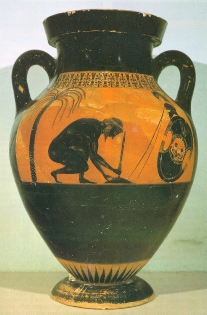Creon
The importance of being persuaded
"And he knows he's right, 'cos he ain't often wrong"
The Ballad of Davy Crockett, King of the Wild Frontier
In Greek the word translated as I obey actually means I get myself persuaded. For a man, therefore, there is perhaps always something a little shameful about obeying someone - as if allowing yourself to be persuaded is a thing a warrior or hero would be embarrassed to find happening to him. In Antigone, Creon repeatedly refers to changing his mind as "womanish" - despite the fact that Antigone herself is a woman and has shown herself just as stubborn. Have you noticed how many of Sophocles' heroes are resistant to persuasion? Rather than "get themselves persuaded", they stick with an idea they believe is right, and run with it until it is too late to change. And sometimes they still refuse to budge even then.
Philoctetes in the play Philoctetes will just not be persuaded by any arguments, however rational - even when giving in would seem to be in his own best interests. In the same play, the young hero, Neoptolemus, is at first very reluctant to be persuaded by Odysseus to try and trick Philoctetes into returning to Troy. He seems to have been won over by his senior colleague, but when he actually gets his hands on the bow, he reverts to his original position, and refuses to steal it. This play, then, contains two examples of warriors/heroes who prefer to avoid the perceived humiliation "getting themselves persuaded".

Ajax, in Sophocles' Ajax believes throughout the drama he was right to want to kill Agamemnon and the other Greek leaders. He never questions this assumption, and prefers to commit suicide when all goes pear-shaped.
Oedipus, in Oedipus the King, won't listen to Teiresias - although he apparently accepts the word of the Chorus that he is the nearest mortal to Apollo. The reason is because he "knows" Teiresias is wrong - and for Oedipus, therefore, his deduction that Creon and Teiresias are plotting against him is entirely logical. If Oedipus knows the truth already - the only possible explanation for Teiresias' conduct is that he's a crook after the throne, with Creon in cahoots.
In the Antigone, there are two stubborn heroes for the price of one - Antigone herself, and Creon. Antigone knows she is right - and the brilliant twist of this play is that she (alone among the reluctant obeyers in Sophocles) is actually right. But, as I have argued, she would not seem right at first to the Athenian male audience. Creon makes a point of not bending. He compares himself to a captain who should stick to his course even if it's wrong - and Haemon's advice about the good ruler bending like branches caught in a flood goes right over his head. But - in another unexpected twist - he does learn! He actually does listen to the Chorus, and take their advice (although his failure to undo his deeds in the right order still leads to tragedy - he should have unburied Antigone before he buried Polyneices, but he is so abject and humbled by having to "get persuaded" that his mental processes seem suspended - a realistic touch, I've always thought.)
In the Athenian democracy, everyone knew how important persuasion was - Euripides as a character in Aristophanes' Frogs tries to justify his line "No temple hath Persuasion save in words" (he and Aeschylus are weighing lines of poetry against each other) by saying that Persuasion was the weightiest thing he could think of. Persuasion was what the Sophists taught (see Aristophanes' Clouds for the mock-sophist who makes the weaker argument appear the stronger - and thus solves all Strepsiades' problems!), and the art/science of Persuasion (rhetoric) was what Plato so whole-heartedly condemned in Gorgias and other dialogues.
But what is the use of persuasion unless people also know how and when to be persuaded? Persuasion is crucially important to a democratic society - but you must be able to take it as well as dish it out! This is the weakness of Sophocles' heroes - a ruler, and a citizen, need to understand both sides of the "persuasion process". For Creon, like Philoctetes, his immunity to persuasion is a matter of pride. But in fact, as the Athenian audience would have recognised, it is a fatal weakness. He believes it is womanish to obey - he does not realise that the ability to accept a superior argument was a necessary skill for the new man in a democratic context. He would indeed, as Haemon tells him, be an ideal ruler "on a desert island". Oedipus, Creon, Ajax, Philoctetes, Neoptolemus are all, in one way or another, examples of political dinosaurs. Presumably there were still plenty such in Sophocles' democratic Athens for him to need to return continually to the theme throughout his dramatic career.


![[Previous Page?]](next.gif)